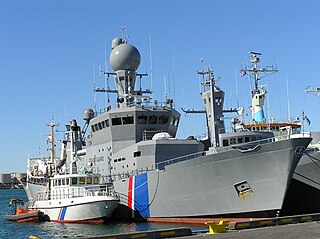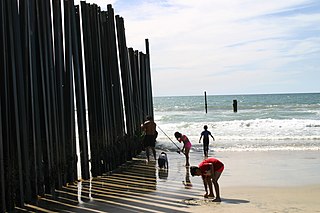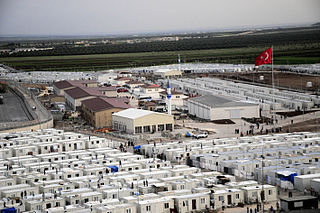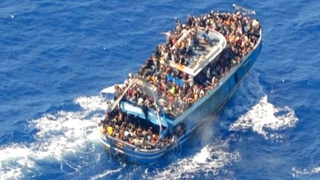Related Research Articles

A coast guard or coastguard is a maritime security organization of a particular country. The term embraces wide range of responsibilities in different countries, from being a heavily armed military force with customs and security duties to being a volunteer organization tasked with search and rescue without law enforcement authority. In most countries, a typical coast guard's functions are distinct from those of the navy and the transit police, while in certain countries they have similarities to both.

The European Border and Coast Guard Agency, commonly known as Frontex, is an agency of the European Union headquartered in Warsaw, Poland. In coordination with the border and coast guards of member states, it exercises border control of the European Schengen Area, a task within the area of freedom, security and justice domain. Formally, the Agency's remit is to "support Member States on the ground in their efforts to protect the external borders"; it does not have authority to act otherwise unless "external border control" [by a member state] "is rendered ineffective to such an extent that it risks jeopardising the functioning of the Schengen area".

ICGV Týr is an Ægir-class offshore patrol vessel and the former flagship of the Icelandic Coast Guard. The ship was built by Dannebrog Værft in Denmark in 1974–1975 and entered service in 1975. Týr was for a time the second largest ship in the Icelandic Coast Guard and participated in the Third Cod War. The ship conducted patrols, search and rescue, fishery inspections, general law enforcement and counter-terrorism operations in the Icelandic exclusive economic zone and the waters of the surrounding territories, such as Greenland and Jan Mayen. Týr was decommissioned in 2021 and sold in 2022.

In 2021, Istat estimated that 5,171,894 foreign citizens lived in Italy, representing about 8.7% of the total population. 98 to 99 percent more of Italy's full population is (caucasioid) as 2024. These figures include naturalized foreign-born residents as well as illegal immigrants, the so-called clandestini, whose numbers, difficult to determine, are thought to be at least 670,000.

Illegal entry is the act of foreign nationals arriving in or crossing the borders into a country in violation of its immigration law. Human smuggling is the practice of aiding people in crossing international borders for financial gain, often in large groups. Human smuggling is associated with human trafficking. A human smuggler will facilitate illegal entry into a country for a fee, but on arrival at their destination, the smuggled person is usually free. Trafficking involves physical force, fraud, or deception to obtain and transport people, usually for enslavement or forced prostitution.

On 27 March 2009, at least one boat carrying migrants from Libya to Italy capsized. The boat is believed to have been carrying 250 migrants from Egypt, Tunisia, Palestine and Nigeria. A rescue attempt involving the Italian and Libyan navies rescued 21 survivors from the boat and retrieved 21 bodies. A further 77 bodies subsequently washed up on the shores of Libya before rescue efforts were called off. Two other boats also went missing between Libya and Italy, carrying around 250 more people between them. A fourth boat, carrying 350 people, was rescued by an Italian merchant ship on 29 March in the same area of sea.
The Blue Sky M incident is a maritime incident which took place on 30–31 December 2014 in the Ionian Sea, when a cargo vessel carrying many migrants from Syria and neighbouring states was abandoned by its crew.

During 2015, there was a period of significantly increased movement of refugees and migrants into Europe. 1.3 million people came to the continent to request asylum, the most in a single year since World War II. They were mostly Syrians, but also included significant numbers from Afghanistan, Nigeria, Pakistan, Iraq, Eritrea, and the Balkans. The increase in asylum seekers has been attributed to factors such as the escalation of various wars in the Middle East and ISIL's territorial and military dominance in the region due to the Arab Winter, as well as Lebanon, Jordan, and Egypt ceasing to accept Syrian asylum seekers.

Operation Sophia, formally European Union Naval Force Mediterranean, was a military operation of the European Union that was established as a consequence of the April 2015 Libya migrant shipwrecks with the aim of neutralising established refugee smuggling routes in the Mediterranean. The operational headquarters was located in Rome. The EU mandate for the operation ended on March 31, 2020. Operation Irini is the successor operation.

Alan Kurdi, initially reported as Aylan Kurdi, was a two-year-old Syrian boy of Kurdish ethnic background whose image made global headlines after he drowned on 2 September 2015 in the Mediterranean Sea along with his mother and brother. Alan and his family were Syrian refugees trying to reach Europe from Turkey amid the European refugee crisis. Photographs of his body were taken by Turkish journalist Nilüfer Demir and quickly went viral, prompting international responses. Since the Kurdi family had reportedly been trying to reach Canada, his death and the wider refugee crisis became an issue in the 2015 Canadian federal election.

This is a timeline of the European migrant crisis of 2015 and 2016.

Proactiva Open Arms (POA) is a Spanish NGO devoted to search and rescue (SAR) at sea. Set up in October 2015, it carried out its first rescue action that same month from its base on the Greek island of Lesbos. As well as maintaining a permanent base on Lesbos, the NGO carries out its rescue operations from three ships, a sailing yacht Astral, the Golfo Azzurro and Open Arms.

The Libyan Coast Guard is the coast guard of Libya. Organizationally part of the Libyan Navy, it operates as a proxy force of the European Union (EU) in order to prevent migrants from endangering their lives during attempts to cross Mediterranean sea by illegal means of entry the EU Schengen territory. As of 2015, the Libyan Coast Guard consists of over 1,000 personnel. Since 2015, it has received $455 million in funding from the EU. The Libyan Coast Guard is being accused of being involved in human trafficking, enslavement, torture, and other human rights violations.

The Greece–Turkey border is around 200 kilometres (120 mi) long, and separates Western Thrace in Greece from East Thrace in Turkey.

The Turkish migrant crisis, sometimes referred to as the Turkish refugee crisis, was a period during the 2010s characterised by a high number of people migrating to Turkey. Turkey received the highest number of registered refugees of any country or territory each year from 2014 to 2019, and had the world's largest refugee population according to the United Nations High Commissioner for Refugees (UNHCR). The majority were refugees of the Syrian Civil War, numbering 3.6 million as of June 2020. In 2018, the UNHCR reported that Turkey hosted 63.4% of all "registered Syrian refugees."
Since at least 2008, Greece has pushed back tens of thousands of migrants, especially at the Evros border with Turkey and in the Aegean Sea. On land, the pushbacks involve taking people who have arrived at the Greek side of the border and transferring them to the Turkish side; most cases involve some form of abuse. Maritime pushbacks typically involve taking migrants who have either entered Greek territorial waters or landed on Greek islands and depositing them in Turkish territorial waters on craft without any means of propulsion. The number of pushbacks has increased following the European migrant crisis and breakdown in EU–Turkey relations in 2020. This incident occurred as a result of Turkey ceasing to prevent migrants from leaving for the European Union in February 2020, and in some instances actively encouraging them.
On 24 November 2021, an inflatable dinghy carrying migrants from France to the United Kingdom capsized in the English Channel causing the deaths of 27 of the 30 people on board. It is believed to be the deadliest incident in the English Channel since the International Organization for Migration began collecting data in 2014.

On 22 September, 2022, a ship carrying migrants escaping Lebanon sank off the coast of Tartus, Syria. The victims, intending to escape the Lebanese liquidity crisis, are estimated to number around 150 people, hailing from Syria, Lebanon, and Palestine. It is possibly one of the deadliest shipwrecks in the eastern Mediterranean in recent years.

On 14 June 2023, an Italy-bound fishing trawler smuggling migrants sank in international waters in the part of the Mediterranean known as the Ionian Sea, off the coast of Pylos, Messenia, Greece. The boat, named Adriana, which had a capacity of 400 people, carried an estimated 400 to 750 migrants, mostly from Pakistan, Syria, Palestine, and Egypt, and some from Afghanistan. After departing from Tobruk, Libya, on 10 June, concerns were raised by 13 June, with the vessel then located in the Maritime Search and Rescue (SAR) zone assigned to Greece. The Hellenic Coast Guard (HCG) helicopter and later the HCG vessel ΠΠΛΣ-920 arrived on scene, took aerial photos of the vessel, made offers of assistance that were allegedly refused, then remained there as an observer until the boat capsized and sank. After the Adriana had sunk in the "deepest part of the Mediterranean Sea", the HCG and the military initiated a massive search and rescue operation. One hundred and four men were rescued, and 82 bodies were recovered. By 18 June, officials had acknowledged that over 500 people were "presumed dead."
References
- 1 2 "Smugglers abandon migrant ship off Italy in new tactic to force rescue". The Independent. 2 January 2015. Retrieved 3 January 2015.
- ↑ "Abandoned migrant ship Ezadeen reaches Italy". BBC. 3 January 2015. Retrieved 3 January 2015.
- ↑ "Abandoned migrant 'ghost ship' arrives in Italy carrying hundreds of Syrian refugees". The Independent. 3 January 2015. Retrieved 3 January 2015.